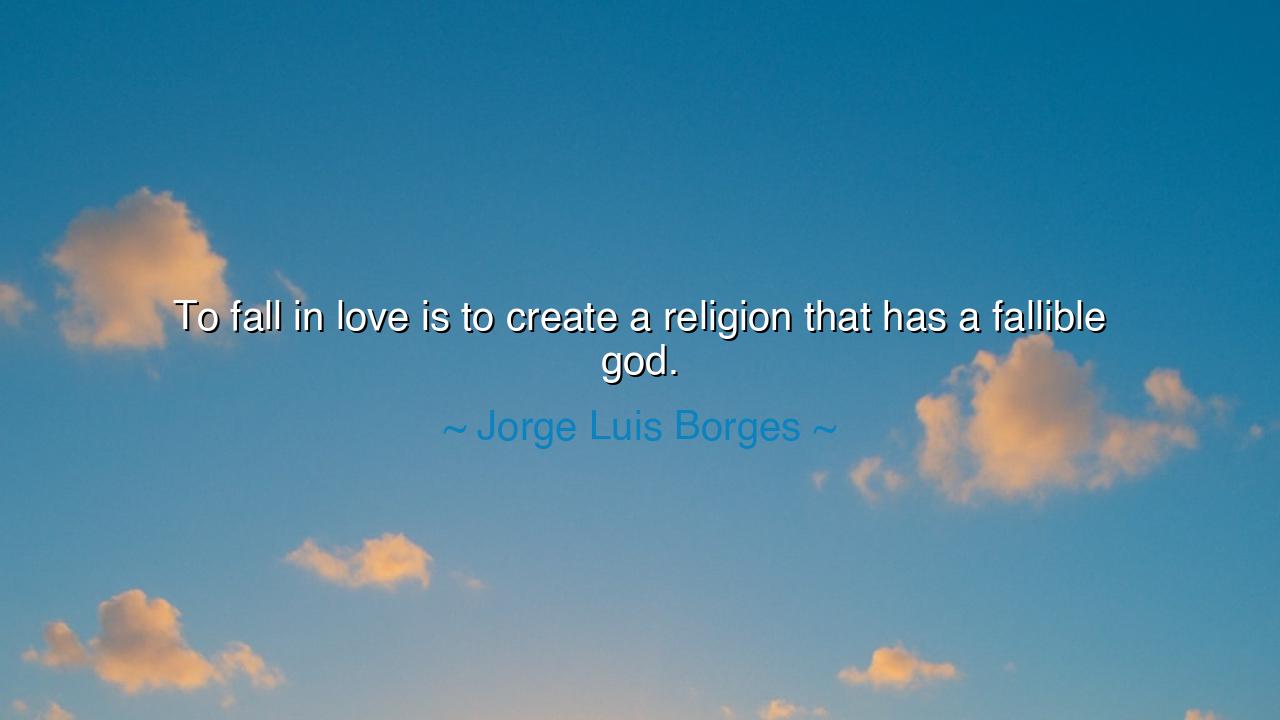
To fall in love is to create a religion that has a fallible god.






“To fall in love is to create a religion that has a fallible god.” — thus wrote Jorge Luis Borges, the Argentinian master of paradox and poet of the infinite. In this brief and piercing sentence, Borges captures the fragile divinity that burns within human love — that sacred madness by which we take a mortal being and, through the fire of affection, make of them something divine. When we fall in love, we do not merely admire another; we worship them. We give them the reverence, the faith, the devotion that once belonged to gods. But unlike the gods of heaven, the beloved is human — fragile, uncertain, flawed. Thus, as Borges warns, the religion of love is built upon a fallible god, and its prayers are written in both joy and sorrow.
To fall in love, in Borges’s vision, is an act of creation. The lover becomes both priest and believer, building an altar in the heart and placing upon it the image of the beloved. Every glance becomes a sacrament, every touch a ritual, every word a hymn. The world reshapes itself around this divine presence. Love transforms the ordinary into the holy — the whisper of a name, the scent of a room, the memory of a smile — all become imbued with sacred meaning. In that sense, love is the most powerful form of faith, for it demands complete surrender without proof, complete trust without logic. It is the human soul’s attempt to find eternity in another’s eyes.
Yet Borges, ever the philosopher of contradictions, reminds us that the god of this new religion is not divine at all. The beloved, however beautiful or noble, is still human — and thus capable of error, weakness, and betrayal. The tragedy of love lies not in loving too deeply, but in expecting perfection from that which is imperfect. Every heart that loves must learn this truth: that the one we worship will one day fail us — not because they are cruel, but because they are human. The fallible god must stumble, and when they do, the religion we built trembles with them.
Consider the tale of Napoleon and Joséphine, whose love once blazed like a royal star across Europe. To Napoleon, Joséphine was more than a woman; she was destiny, muse, and goddess. He wrote to her with the fervor of a prophet — “I awake full of you. Your image and the memory of last night’s intoxicating pleasures have left no rest to my senses.” Yet as power grew and distance widened, their divinity crumbled. Joséphine’s infidelities, Napoleon’s ambition, and the weight of empire turned worship into disillusionment. He had loved her as a god; he was forced to see her as mortal. And so, as Borges foresaw, the religion of love collapsed under the truth of humanity.
But in this collapse, Borges does not counsel despair. For though love’s god may be fallible, the act of love itself is sacred. To love deeply is to touch the divine, even if for a fleeting moment. The pain that follows is not proof of folly, but of the soul’s courage. To love is to risk worshiping something imperfect — and to forgive it when it fails. This is what makes love both beautiful and tragic: it mirrors the very struggle of humanity with God Himself — to seek perfection in an imperfect world, to adore and to be wounded by what we adore.
Thus, Borges’s words are not a rejection of love, but a warning and a blessing. He tells us: love, but love with open eyes. Worship, but remember the altar is built upon the earth, not the heavens. Do not curse the beloved when they fall; instead, honor the courage that dared to believe they could stand as gods at all. The pain of love is the price of its divinity. The heart that has never been broken has never truly worshiped, never truly lived.
So, my friend, when you love — love fiercely, but humbly. Offer your devotion, but do not forget the mortal behind the miracle. Let your love be both passionate and patient, reverent yet real. For though the god may fall, the faith remains — not in perfection, but in the beauty of the attempt. As Borges teaches, to fall in love is to touch both heaven and earth, to hold the divine in trembling hands, and to whisper a prayer to a god who, though fallible, is still worthy of love. And perhaps that is the greatest mystery of all — that even broken gods can make us whole.






AAdministratorAdministrator
Welcome, honored guests. Please leave a comment, we will respond soon